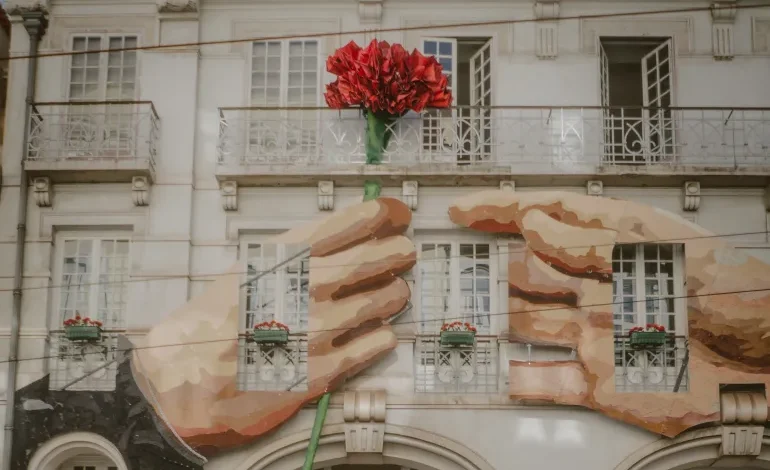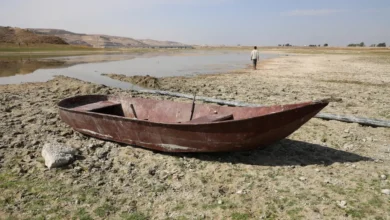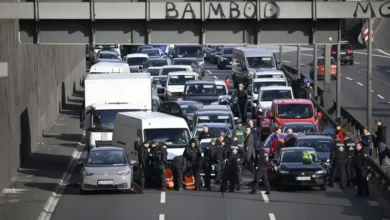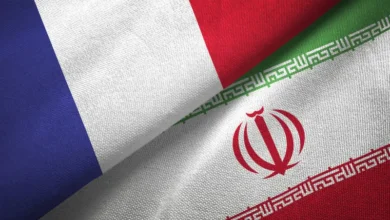‘No turning back’: Carnation Revolution divides Portugal again, 50 years on

The olive-green military vehicles are the same, as are the uniforms of the personnel riding them. It’s even the same day of the week on this April 25 – a Thursday.
This is when it all started, on the shore of the Tagus River where the sun hangs like a bulb over the Portuguese capital and Europe’s westernmost edge.
But the cheering crowds beside the road today, waving red carnations bought from flower ladies on Rossio Square weren’t there 50 years ago. Nobody clapped their hands or posted photos on social media along with catchy hashtags.
On that brisk dawn, the streets were deserted while Lisbon still slumbered, while a revolt was taking birth. That morning, Portugal was still a fascist dictatorship that had fought three brutal wars in Portuguese Guinea, Angola, and Mozambique in its desperate bid to keep control over its African colonies. By the end of the day, Portugal’s 42-year-old dictatorship, Estado Novo (“New State”), had been felled by a swift military takeover.
“We were professional soldiers, we’d been in wars and were trained to deal with stressful situations, but this was something completely different,” says former navy captain Carlos Almada Contreiras.
Contreiras was among the 163 military captains who in September 1973 had come together in secret at a “special farmhouse barbeque” to form the clandestine “Movement of Armed Forces” (Movimento das Forcas Armadas, MFA). These were men who had fought the Portuguese dictatorship’s colonial wars and knew very well that no military victory was close at hand; on the contrary, morale was in decline and an estimated 9,000 Portuguese soldiers had died since 1961.
On April 25, 1974, they turned their gaze towards Lisbon’s political heart, intending to seize control of key military installations, political chambers and broadcasting facilities, as well as the airport. At the time, 50 years ago, nobody could predict the outcome of the day.
However, the rebels knew that “there was no turning back,” says Contreiras.
It was now life or death – if the military action failed, the MFA conspirators would in all probability have been charged with high treason and quite possibly sentenced to death. But a victorious outcome might just bring a new dawn for a dying empire in its last throes.
Was he afraid? Contreiras takes a deep breath and recalls that morning when his life – and the lives of numerous others – changed forever. “I haven’t thought of that,” he says. “We had to act, otherwise we would continue to live in this dead political system, keep fighting these meaningless colonial wars.”
In the end, and in less than a day, MFA gained full control over Portugal’s military facilities and brought an end to the far-right dictatorship. Prime Minister Marcello Caetano bowed to the conspirators and Portugal’s notorious secret police – PIDE – was dismantled.
The following year, 1975, a US-backed counter-coup in November would supplant the new government and the Carnation Revolution would come to an end. But the change it had brought about was permanent.
“The people of Portugal and millions of people in our African colonies were given their lives back,” says Contreiras.
As Portugal celebrates 50 years of pluralistic democracy today, however, the long shadows of the country’s authoritarian past are creeping back in the wake of the March 2024 elections, in which far-right political party Chega (“Enough”) gained 18 percent of the vote and drove a wedge through the heart of the Portuguese two-party system, which had dominated the chambers of power since the 1970s.
A revolution is born
On April 25, 1974, Portugal became world news. Newspapers around the world were drenched in bright images of celebrating Portuguese masses who took to the streets and placed red carnations in soldier’s rifle barrels and uniforms. Portugal’s “Carnation Revolution” is often described as a near-bloodless military takeover. But much blood had been spilled in the years leading up to that moment.
In the early 1960s, as most African nations fought for and won independence from their European colonisers, Portugal stood firm in its claim to the country’s African “possessions”. These were now dubbed “Overseas Territory” instead of “colonies” as a result of a 1951 rewrite of the constitution and the country had responded to self-determination claims with brutality and repression.










